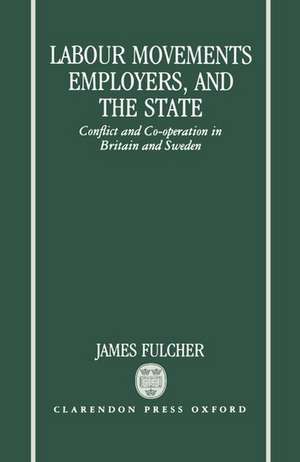Labour Movements, Employers, and the State: Conflict and Co-operation in Britain and Sweden
Autor James Fulcheren Limba Engleză Hardback – 3 oct 1991
Preț: 950.86 lei
Preț vechi: 1443.60 lei
-34% Nou
Puncte Express: 1426
Preț estimativ în valută:
181.96€ • 188.90$ • 151.73£
181.96€ • 188.90$ • 151.73£
Carte tipărită la comandă
Livrare economică 11-17 martie
Preluare comenzi: 021 569.72.76
Specificații
ISBN-13: 9780198272892
ISBN-10: 0198272898
Pagini: 384
Dimensiuni: 143 x 223 x 27 mm
Greutate: 0.62 kg
Ediția:New.
Editura: Clarendon Press
Colecția Clarendon Press
Locul publicării:Oxford, United Kingdom
ISBN-10: 0198272898
Pagini: 384
Dimensiuni: 143 x 223 x 27 mm
Greutate: 0.62 kg
Ediția:New.
Editura: Clarendon Press
Colecția Clarendon Press
Locul publicării:Oxford, United Kingdom
Cuprins
Introduction; Institutions, the state, and capitalism; Part I: Industrialization, Democratization, and Class Organization: The formation of labour movements; The employer counter-attack; Part II: Towards Central Regulation: Towards joint central regulation in Britain; State regulation and joint central regulation in Sweden; Part III: Industrial Conflict, Institutions and Corporatism: Institutional inadequacy, corporatism, and industrial conflict in post-war Britain; Institutional adequacy, corporatism, and industrial conflict in Sweden; Part IV: Capitalism, Neo-liberalism, and Socialism: Capitalism and neo-liberalism in Britain; Capitalism and Socialism in Sweden; Summary and concluding discussion
Recenzii
`The author supplies a very interesting historical background to recent developments.'Labour Research Development
`John Fulcher's comparative study of British and Swedish trade unions and industrial-political relations rewards careful study.'Tribune
'James Fulcher has written an excellent book which is both scholarly and comprehensive. It is an example of comparative sociology at its best.'VRichard Scase, University of Kent at Canterbury, British Journal & Industrial Relations
'The first half of the book is a historical tour de force ... Fulcher has provided us with a well-reasoned , carefully and thoroughly researched analysis of variations in the Swedish and British industrial relations systems.' Economic and Industrial Democracy
'an impressive, thought-provoking piece of scholarship'Michael Moran, University of Manchester, Political Studies (1992)
`[Fulcher's] fascinating use of a new historiographical type of analysis reveals a great deal of new comparativve history about each country.'Choice
`James Fulcher has written a pretty solid book ... He draws on a wide range of original sources, which those with less Swedish would simply not be able to do.'Sociology
`Here, a comparative, disciplined, multi-causal, multi-layered, historical and dynamic model has been used to illuminate in a most interesting manner how and why Britain and Sweden developed quite different sets of labour movements and leftist parties, as well as opposing industrial relations structures and political systems, despite their common industrialization and democratization and the recurring dilemmas of social democrative reform efforts.'West European Politics
'useful and readable ... solid, well-researched, competent, and fair, ... Fulcher's book is significantly new and original'Richard De Angelis, Flinders University of South Australia, West European Politics, Vol. 15, No. 4, Oct 1992
'this book, based on an impressive command of the Swedish literature, easily equals even the best available works in Swedish'Peter Swenson, University of Pennsylvania, Industrial and Labor Relations Review
`James Fulcher has written a solid book. It is important not just for the author's considerable knowledge of Swedish sources but also for his skill in deploying a detailed comparative and historical argument.'Labour History Review
`The Swedish system of industrial relations has been held up as a model and a reproach to the British for so long that it is refreshing to be offered an objective comparison which challenges accepted wisdom ... Fulcher has written an important book which has something fresh and useful, if rather complex, to say to the conflicting and cooperating individuals who operate the industrial relations of modern societies and stand in need of its insights.'Journal of Interdisciplinary History
`John Fulcher's comparative study of British and Swedish trade unions and industrial-political relations rewards careful study.'Tribune
'James Fulcher has written an excellent book which is both scholarly and comprehensive. It is an example of comparative sociology at its best.'VRichard Scase, University of Kent at Canterbury, British Journal & Industrial Relations
'The first half of the book is a historical tour de force ... Fulcher has provided us with a well-reasoned , carefully and thoroughly researched analysis of variations in the Swedish and British industrial relations systems.' Economic and Industrial Democracy
'an impressive, thought-provoking piece of scholarship'Michael Moran, University of Manchester, Political Studies (1992)
`[Fulcher's] fascinating use of a new historiographical type of analysis reveals a great deal of new comparativve history about each country.'Choice
`James Fulcher has written a pretty solid book ... He draws on a wide range of original sources, which those with less Swedish would simply not be able to do.'Sociology
`Here, a comparative, disciplined, multi-causal, multi-layered, historical and dynamic model has been used to illuminate in a most interesting manner how and why Britain and Sweden developed quite different sets of labour movements and leftist parties, as well as opposing industrial relations structures and political systems, despite their common industrialization and democratization and the recurring dilemmas of social democrative reform efforts.'West European Politics
'useful and readable ... solid, well-researched, competent, and fair, ... Fulcher's book is significantly new and original'Richard De Angelis, Flinders University of South Australia, West European Politics, Vol. 15, No. 4, Oct 1992
'this book, based on an impressive command of the Swedish literature, easily equals even the best available works in Swedish'Peter Swenson, University of Pennsylvania, Industrial and Labor Relations Review
`James Fulcher has written a solid book. It is important not just for the author's considerable knowledge of Swedish sources but also for his skill in deploying a detailed comparative and historical argument.'Labour History Review
`The Swedish system of industrial relations has been held up as a model and a reproach to the British for so long that it is refreshing to be offered an objective comparison which challenges accepted wisdom ... Fulcher has written an important book which has something fresh and useful, if rather complex, to say to the conflicting and cooperating individuals who operate the industrial relations of modern societies and stand in need of its insights.'Journal of Interdisciplinary History












